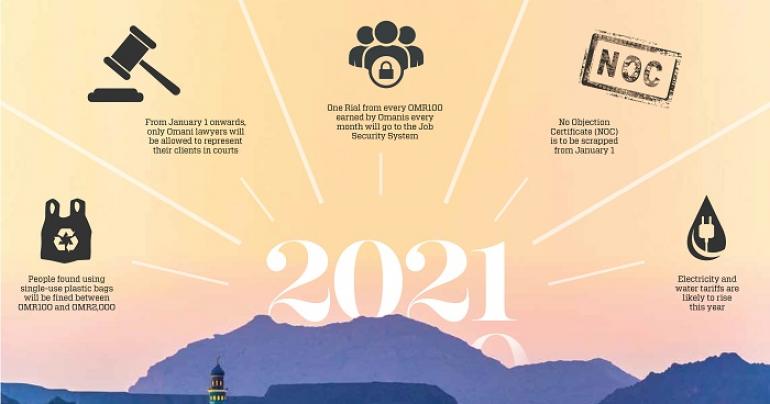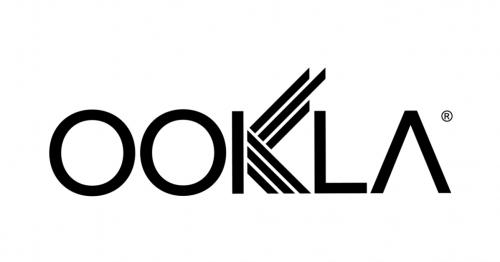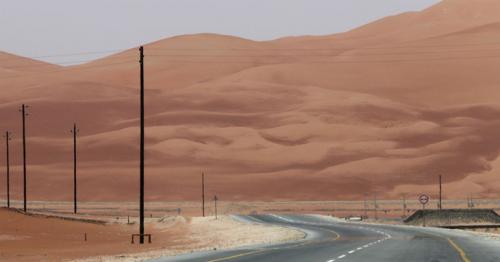Changes on Oman’s horizon for 2021
Muscat: A number of measures designed to help Oman grow will come into effect from Friday, January 1.
In 2021, single-use plastic bags will no longer be available in stores, as part of the government’s plans to safeguard the environment for the future generations. Expats will also be able to move between companies in a freer manner, with the no objection certificate (NOC) being scrapped.
Electricity and water subsidies could also be steadily phased out, and one Rial out of every OMR100 earned by Omanis every month will go to the Job Security System.
As part of the country’s Omanisation efforts, expatriate lawyers will no longer be able to practice in courts.
This aside, a value-added tax on selected goods and services is expected to come into effect on 16 April 2021, in addition to many government units expanding their online operations.
Shahswar Al Balushi was the head of the Tanfeedh Labour Labs that worked on the processes around the scrapping of the NOC. “The NOC was firstly brought in to regulate the movement of expatriate labour in the country, because it was felt that there were too many expats in the country, and the need was to prioritise opportunities for Omanis,” he said.
“During the COVID-19 pandemic, a lot of expatriates left, so the balance between Omanis and expats has now shifted more in favour of the locals.
“This means there are now more opportunities available for locals, and there will be even more when the economy picks up again, so it was decided to encourage free movement of expat workers again,” said Al Balushi. “Oman is also working towards attracting foreign investment, so free movement of labour will encourage more investors to seek out this market.”
Adding to this, Dr Hesham Magd, the head of the Faculty of Business and Economics at the Modern College of Business and Science, said, “With this, both employer and employee are winners. The employee is happy he can get a better job, the employer can hire from the local market without wasting resources searching abroad for a candidate and training them all over again.”
Commenting on the planned phasing out of the electricity and water tariffs, he said the plans had been drawn up so that customers in the country would be able to adjust to the new rates over the planned five-year period, rather than feel the shock of the increase in cost all at once.
“The electricity and water in our country is subsidised, so that it is affordable to everyone, but the government’s cost of bearing this is more than OMR500 million,” said Al Balushi.
“The money going here could be used for investment into projects for economic expansion, or used for social development, particularly in those areas that most need it.”
“There are some who still need these tariffs – the vulnerable sections of society – for example, but that is not true of those who are earning well among Omanis and expats, or large companies that have more than enough capital to pay for these utilities,” he added. “Consumers feel they might be negatively affected by this, but what it will lead to is more judicious use of our resources, which cost a lot to generate.”
Complementing Al Balushi’s view, Ramanuj Venkatesh, a financial analyst in the country, added that the money could be used to rebalance Oman’s fiscal deficits, and develop infrastructure where needed.
“Phasing this out will make sure the consumer’s pocket is not hit so hard, especially since a change in tariffs will take time to get to grips with,” he revealed. “The revised plan will help Oman boost its local bond ratings, which took a hit because of the pandemic and decline in oil prices.”
Magd said, “A sense of responsibility will begin, and although the employment process could slow down in the private sector, there will be a transition period after this takes place. The government will be able to reduce the fiscal deficit and the debt burden will lighten.”
Value added tax, when it does come to Oman in April 2021, will see a 5 per cent tax introduced on goods and services. 90 essential items, however, have been exempted from this, most of them being food and medical products needed for our daily living.
Al Balushi chose to allay fears about VAT hitting people’s spending capabilities strongly, saying that the tax rate in Oman will be far lower than it is in many countries around the world.
“The alternative was to devalue our currency, which would be very bad for the country,” he admitted. “The common people would’ve been most hard hit by this, because the purchasing power of the Rial would decrease, and that means everything would have become 15 or 20 per cent more expensive. “It is better, therefore, that costs of items only rise by five percent. Even then, many key items are exempt. This will make consumers use their money wisely, instead of spending lavishly where not needed.”
Venkatesh added, “Sectors affected by VAT include supply, logistics, trade, finance, and foreign direct investment. Taxing these will contribute around 1.5 to two percent of the Gap.” And as Magd said, “VAT will provide a permanent, reliable revenue stream for the government. As an alternative source of economic development, VAT reduces economic dependence on oil.”
Starting next year, all Omani employees in the country will need to contribute one Rial of every OMR100 earned every month to support the Job Security System (JSS).
Launched on November 1 to provide decent standards of living for Omani jobseekers, it is jointly run by the Public Authority for Social Insurance (PASI) and the Ministry of Labour.
Customers will also need to get used to shops no longer selling single-use plastic bags to customers. They will be replaced by reusable bags made from cloth, paper, and other recyclable materials. Oman’s Environment Authority has, for the past few weeks, run awareness campaigns in multiple languages, along with a countdown to when the plastic bag ban takes effect.
“Plastic bags contain a high proportion of lead,” said the EA. “When exposed to sunlight, toxins harmful to our health are released from the bags. As of January 2021, Royal Decree No. 23/2020 will come into effect, banning the use of non-recyclable plastic bags.”
Other problems posed by plastic bags, per the authority, include animals dying after choking on them, preventing sunlight from reaching the roots of trees, thereby stunting their growth, and the leeching of their chemicals into the environment over the long-term. Female workers who make plastic bags handle chemicals that increase their chances of miscarriage, while lowering testosterone levels in males.
To promote Omanisation in the judicial sector, from 1 January onwards, only Omani lawyers are allowed to represent their clients in court. Expat legal advisors, though, can still provide mediation services outside of the courtroom.
“The rule was brought in to encourage and help more Omanis to take up jobs as lawyers and other associated practices,” said MU Solomon, a legal consultant in Salalah.
“Court cases in Oman are normally held only in Arabic, so clients would hire expat lawyers who spoke Arabic to mediate, while non-Arabic speakers could also assist with the case in the courtroom. That has, however, now ended.”
tag: omannews , omanlatestnews , muscatnews
Share This Post






